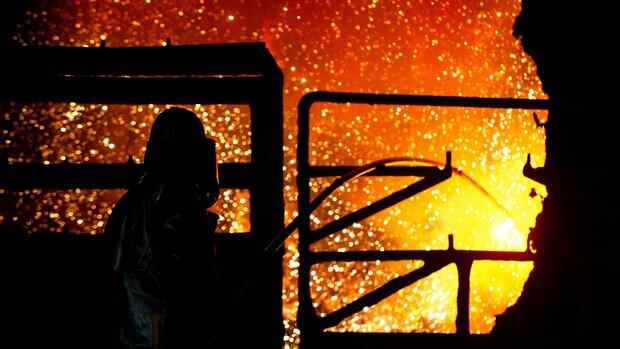An employee cleans a pig iron ladle in the Salzgitter AG steelworks. The export of steel to the USA is becoming easier again.
(Photo: dpa)
The agreement on punitive tariffs gives reason to hope for an easing of the international trade disputes. But above all, it is evidence of American pragmatism in times of high inflation. US President Joe Biden and EU Commission President Ursula von der Leyen celebrate the suspension of punitive tariffs on steel as a “milestone” and speak of a “new era of transatlantic cooperation”.
In fact, for Biden, the focus is less on the transatlantic relationship than on the pressure at home. Delivery bottlenecks and inflation of more than five percent are causing problems for import-dependent American consumers.
The resentment in the US population is growing. The steel tariffs come in handy as a simple adjustment screw with which Biden can give the US industry some breathing space, at least when it comes to steel costs: In the future, the US will be allowed to import certain amounts of steel from the EU without incurring 25 percent penalty tariffs. In return, the Europeans are dropping their retaliatory tariffs on whiskey, jeans and Harley Davidson, which should even double in December.
In times when consumers on both sides of the Atlantic are already struggling with rising prices, any elimination of additional costs is welcome. It is also long time that the relationship between the Europeans and the US improved. But a temporary relenting of the steel tariffs does not start a new era.
Top jobs of the day
Find the best jobs now and
be notified by email.
US foreign policy is shaped by pragmatism
The idea of many Europeans that Biden would wipe all the rules of the Trump Ice Age off the table when he took office and restore good transatlantic relations without any demands has proven to be a fallacy. This applied not only to the punitive tariffs, but also to the entry ban, which for EU citizens will not fall until November 8, while people from other countries with much higher Covid rates have been able to enter the country for months.
US foreign policy has always been characterized by enormous pragmatism, despite all the lofty rhetoric. This time, too, the “new era of transatlantic relations” in the form of lower steel prices comes in handy for Biden, if it means that US car prices can drop somewhat.
More is needed for a new era. The EU and the USA should work together more closely, particularly on China and on climate change. The envisaged agreement, for example, to tie trade in steel and aluminum to CO2 consumption and thus restrict access to the US market for “dirty” steel from China, is a good example of this. And a pragmatic one.
More: The US and the EU defuse punitive tariffs from the Trump era – but the dispute has not yet been finally resolved
